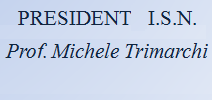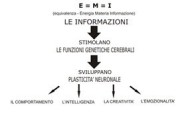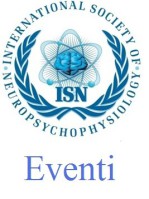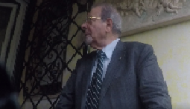A “PILOT” TO BE TRAINED
"From DNA comes the Brain, from the Brain comes the Consciousness"
Michele Trimarchi, psychologist
Our brain is a wonderful tool, projected to generate in oneself an unique and one-time being capable to manage all of the genetically ready
powers in order to gradually discover the marvels of this world created to deliver happiness. The child, on birth, is gifted with this tool of unlimited power, and during growth the
‘pilot’, capable to manage this power, is to be trained. The pilot is a conscious ‘I’, capable to manage all of the brain’s features and use the space-time of existence to have a creative
and harmonic expression by having a part in social cultural and human evolution.
The nervous system is provided with perfect ‘mechanisms’ and its replies are always structured
and arranged according to genetically programmed principles and functions: this allowed and still allows human being to express and live at a psycho-moving level, cognitive level,
emotional and related level ‘without the brain as a pilot’, i.e. without an ‘I’ capable to rule, moment by moment the brain and decide actions and behaviours on the base of an
‘evolutionary utility’ sense for the person.
Biological birth must be preparatory for the birth of conscience, which, under a correct education, should develop around age 7-8 to go on growing
and improving during all life time. We can say that the real birth happens when we become conscious we have such a powerful tool like our brain and we learn to use it in the best
way: the chaos most of human beings live in, witnesses the conscience is still missing within human brain, otherwise the world would be a place much different than the one we are living,
we would not see psychopathologies spread everywhere, use and abuse of drugs and psycho-medicines, every kind of deviance, dramas and conflicts at every age and level of social life
(not to talk about the serious and increasing pollution and variation of ecosystem we live in).
Without a conscious ‘I’ everybody acts “obeying to a momentary Lord” which develops within the brain on the base of memories, social and cultural
examples, conditionings: when these features are summoned rule the behaviour, preventing the conscious and creative expression of the person, who finds oneself, notwithstanding,
fighting with conflicts, anxieties, unease, suffering generated by chaos and conflict information received since the beginning of life.
Within the brain we have the front lobes of the two hemispheres and within them, during
lifetime, a conscious ‘I’ must be shaped and establish as the owner. The conscious ‘I’ is not an abstract entity, it’s a reality which has to manage the features of both
hemispheres as within them is the control centre of the brain and the whole body, there everything gets and from there everything starts, and the control centre must be ruled and used
by the ‘I’ to prevent its tools and feature to act automatically. The person (child or adult) must be present in the brain, must be conscious of how it works and how he can
decide by himself at any moment the order in any part of the body: the person must be able to rule body and brain, by using his own intelligence to plan and complete his actions and
life.
The ‘I’, the pilot, should decide everything, plan and complete from the lowest levels. If we
decide to move a finger in a certain way can’t we do that? If we decide to scream can’t scream? If we decide to hold our tongue, can’t we hold it? If we decide not to respond to a taunt,
can’t we do that? If we decide to change our mind on an idea we think is wrong, don’t we change? We can do all what we decide: we just have to think, plan and execute as we wish.
We have to decide for ourselves, not the stimulus from the outside. But who ever taught us that we can decide for ourselves? We learn to walk since childhood and then we
move on the mood: we are depressed and we can’ move anymore, we are in anxiety and we move too much… but where are we? Where is the pilot of the brain, our ‘I’?
One of the most serious deficiencies of neuroscientific research is not to have clarified the goal of the brain, that’s where NPP has focused:
the goal of the brain is to generate an ‘I’ who becomes its supreme owner to manage and decide about his own life respecting himself, human and natural environment. The
evolutional age psychology has detailed the several steps of movement, cognitive, emotional, social development, but what must develop first? What sense does it make, substantially, the
development of more features and skills if, meanwhile, we don’t develop an ‘I’ capable to manage them? Our genetic program plans a gradual development of capabilities and biological
functions, such a development is ready at puberty age, as a person in puberty can already generate, and the body is ready to express at all levels. But, meanwhile, do we develop
consciousness and conscience of such features and capabilities? Almost never… there’s almost never a conscience development together biological development, as the owner of the
brain doesn’t grow nor gets shaped, as people existence is in the facts managed by experiences and their interpretation, and by impressed memories.
‘I’ is not apart from the brain, but develops within it from a kind of “white energy” that gets coloured by interacting with the environment, and the first
colour, i.e. the first capability it has to develop is discover and rule the body. Every activity of the child in the first period of life is aimed to discover the body and its features,
its potentialities which he must become conscious of by gradually experimenting. Unfortunately today, in most of cases, the child is strongly limited in the physiological pulse
to discover and experiment his potentialities as the environment around is often chaotic: he moves in an environment being artificial for the most, full of packaged stimulus
(cartoons, industrial toys) that don’t help his sensorial perceptive and creative capabilities, unlike natural stimulus, not to mention disharmonies and strains he often absorbs from the
family and which limit the gradual development of self-confidence, autonomy, and self-worth. A child would like to be always in focus of attention, not just because it’s a “bad
habit” but because he needs to, it’s a genetic pulse he is born with: being in the focus of attention means receiving from the environment all the nutritious features human being needs
to develop and grow, from sensorial to emotional stimulus in a continuity with no separations: the child needs to feel important for the environment he lives in, he needs to
feel loved, respected and favoured in his pulse to explore and experiment himself, he needs his main figures to “talk to his I”, to that immense energy being within him which has to
gradually take control of the brain to generate a conscious I.
This society has generated a so-called educational system that in the facts conditions and
imprisons the child within rules and models to be absorbed without even know the substantial reason, but such a system hurts the dignity and potentialities of human being. The child is a
wonderful project, so immense, and the goal of education must be the promotion of the full accomplishment of it, by helping the gradual development of a being capable to manage his
own brain by developing conscience and consciousness of himself as a unique and one-time being, capable to create and express harmony. NPP has given such concepts a scientific
validity, has studied human brain to understand the birth of conscience, of behaviour and of mechanism why a person is capable to kill due to hate and meanwhile love and generate
life for the achievement of universal values. From such studies it has come to surface that the key to understand human existence and the goal of life itself is just the birth of a
conscious I of every person, and education has an unreplaceable role in helping or delaying such a birth. Human being can become a “genius” or an “automaton”, can express wisdom or
triviality, can create harmony or chaos, everything depends on the quality of the education he receives: in the absence of genetic diseases or organic deficit, the child at the birth has
all the potentialities do develop genius and wisdom, but if he’s blocked by restricted educational rules, impositions, humiliating censures, punishments, expectations, all of this
strongly limits the expression of his potentialities. It is instead necessary focusing his powerful life-energy in a way that allows him to always express himself, explore and know,
experiment himself, develop his creativity. Educate means ‘educere’, just pull out, not condition; that means stimulating the child to come out to watch and verify what is
around him, he should not learn anything without its meaning and utility. A child who learns to verify all that he experiments, to understand it in its real utility, discovers and becomes
gradually conscious of the world around and of himself, and this is a genetic pulse that shows up since birth. The child is born as a ‘scientist’, wishing to discover and know, but such
a pulse is blocked and paralyzed by endless prohibitions and impositions that, even if made in good faith, are imparted since childhood. Some children achieve to revolt looking
however for ways to express oneself, even at a very high price; some other fit in and, as long as they can, become perfect “social models”. But they who decide to fit in with no
criticism, with no choice or evaluation opportunity, don’t allow human kind to evolve, otherwise human kind would be already perfect. Human being is not a model, but a dynamic
reality, and the brain needs continuously stimulus to feed it, needs to evolve, to go on, to interact constructively with the environment, and the whole environment –
within and outside – starts from a physical base, as everything is physical. The word is a physical stimulus, it’s energy, and there’s nothing that is not energy in our universe. Every
kind of energy inform us constantly about its existence as our brain is capable to measure it, and could measure it physiologically if it wasn’t under conditionings going to distort
its measuring tools, exactly as explained by Pavlov through his experiments on classic conditioning: if we associate a conditioning stimulus to a physiological one, the
physiological reply will be produced by the conditioning stimulus instead of the physiological one, and this may be generalized to the whole human behaviour. By continuously putting
human being through conditioning stimulus we separated the functionality of its two cerebral hemispheres, right and left, we disassociated the being from his ‘I’, that ‘I’ that
should use both hemispheres to go on growing in conscience and knowledge. This is always it: unity of human being ruled by his ‘I’. Plato used to talk about a chariot driver, driving a
white and a black horse, NPP talks about ‘I’ that has to rule right and left hemisphere to develop an useful behaviour for his own and others’ evolution. And the ‘I’ doesn’t come out
of thin air or suddenly appears at a certain point of the development, but must be put in condition to be gradually generated from an education that respects the immensity of child and
helps his identification. The child must be able to identify himself and develop his own conscience through which use in the best way his body and brain to create all that he
decides to create. But when ever do we direct our attention to the ‘I’ of the child? When ever do we ask “what do you feel, what do you think, what did or didn’t you understand”? When do
we stay with a child to try to let him come out, to let him substantially express, to stimulate him to create projects? Life itself must be a project to be carried on, but
we need to say it to the child, otherwise we consider him as “mutilated”, we consider him as a container to be filled with a mass of information without giving him the gradual opportunity
to verify, select and choose the most useful ones for his own psycho-physical and spiritual growth. The capability to decide for one’s own life belongs to every human being:
everyone of us is potentially capable to decide how to behave, answer or hold the tongue, act or let ride, accept a compromise or keep one’s position…we can decide everything if it’s our
‘I’ to evaluate situations and manage our brain. We can even decide to live happy, nobody can prevent us but our conditionings and memories, but we can identify and modify
conditionings so to enrich our experience and knowledge, and we can learn to file memories and use them just when we need them. Memories reside within temporal-parietal-occipital
lobes, which constitute a kind of “file”, while frontal and prefrontal lobes are the site of the ‘I’, of the determined capability to identify, evaluate, verify and decide on the
base of the dynamism of reality.
Through our ‘I’ we can file memories while remaining free to observe, identify, verify all that
happens around us and we can decide, make projects, and complete all that we think is useful for our life. Memories are our past, and from past we have to take only what is useful for
present: the I lives the dynamism of present, by managing our sense organs, our body, our behaviour, our mental and creative activity. Too many destroy their own existence and
don’t live the present because they remain anchored to past, with its load of memories often painful; we must acquire the certainty that the present is in our hand and it’s up
to us planning it and living it by using positively experiences, as we are conscious of our uniqueness and of our and others’ sacred life. As a synthesis, if we manage the brain with
our ‘I’, by filing memories, we decide what has to happen to has and what hasn’t, what we want to complete and what we don’t, learning meanwhile to manage those happenings that do
not depend on our will. Most important thing is keeping memories in their place, in their files, and get them out only when we decide, exactly like when we open a file on a PC. In a PC
files are opened only on user demand, while in human brain it just takes a stimulus which associates to a memory and that, in the absence of the ‘I’, is automatically recalled and
makes us live the same suffering for example of twenty years before.
Therefore our brain is an immense power: if we manage it we can really be “creatives” on
Earth, instead, if it is managed by outside stimulus and by all that comes to us daily we are continuously “objects” piloted by various memories, with all the pain they often take within
and we also put in present, preventing ourselves the opportunity to project and decide for our life creatively and constructively.
Michele Trimarchi - ISN President
"Cultura e Natura"






